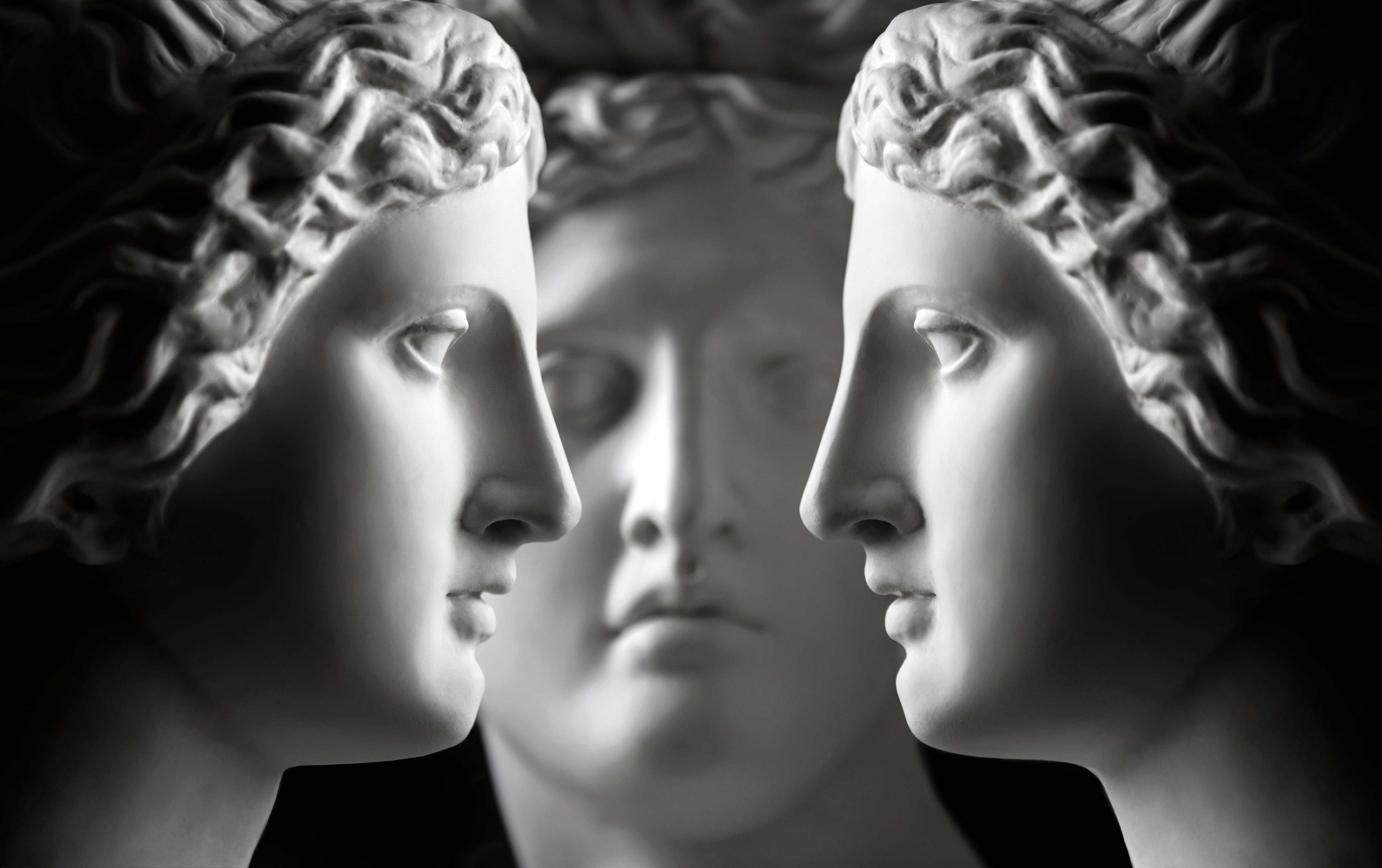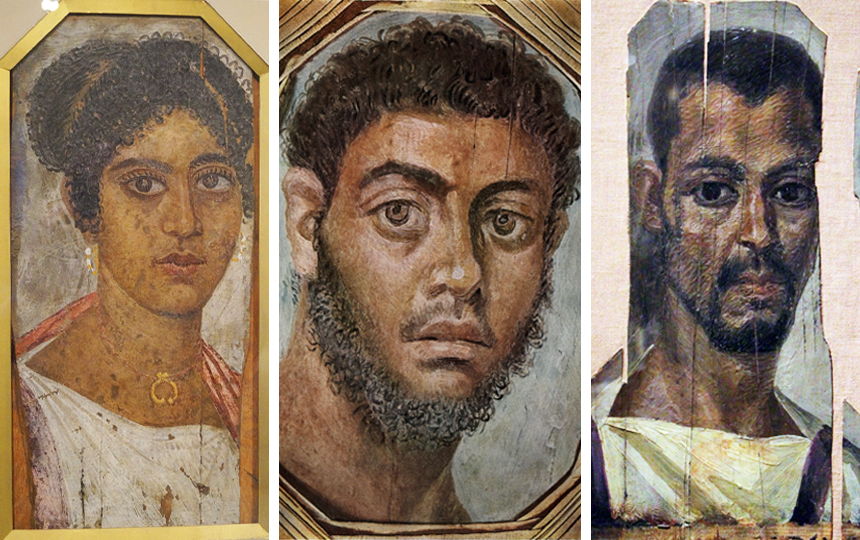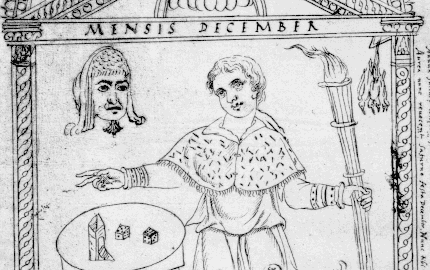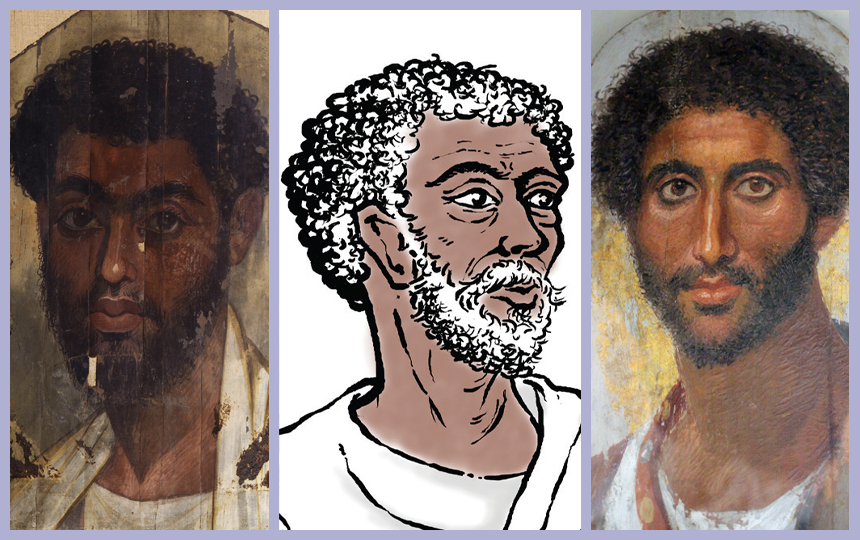Diversifying the teaching provision of Classics and Ancient History does not necessarily help us to ‘decolonise’ the discipline and engage in anti-racist pedagogical practice. Dr Elena Giusti reflects on her undergraduate module 'Africa and the Making of Classical Literature' at the University of Warwick.
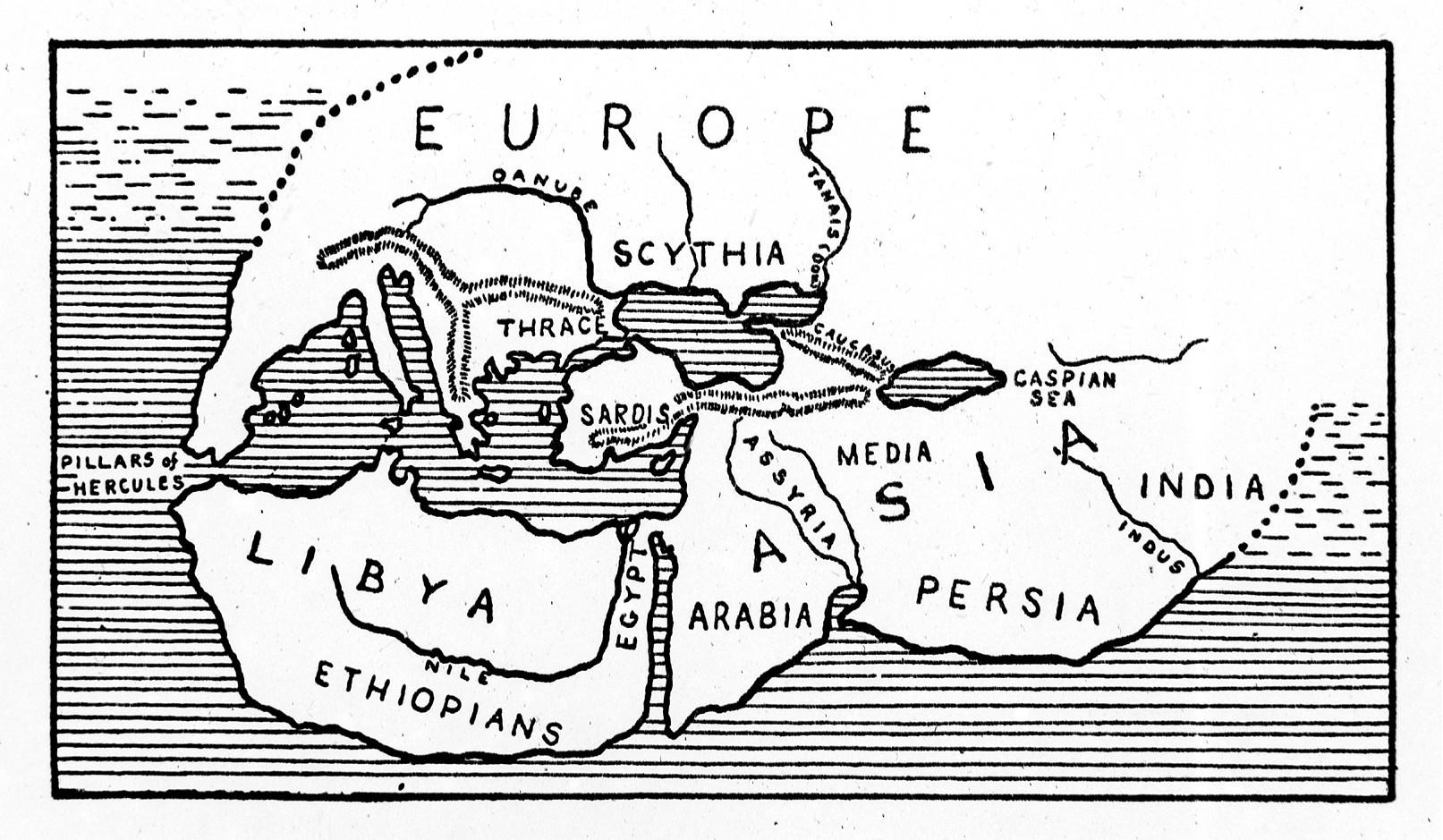
Submitted by Anonymous on Tue, 15/09/2020 - 15:36
A map of the world according to Herodotus.
Last year, among the many articles that followed the aftermath of the racist incidents that occurred at the 2019 meeting of the Society for Classical Studies in San Diego, I came across a sarcastic comment from an anonymous detractor of the decolonisation of Classics syllabi. It said something along the lines of: “I wonder what a Classics course on Africa would ever look like”.
At the time, I had almost finished teaching my new module ‘Africa and the Making of Classical Literature’, and my immediate answer would have been: “Actually, very canonical”. My students had been reading, among other authors, Homer, Herodotus, Aeschylus, Euripides, Virgil, Horace, Sallust, Livy. ‘Africa’ in our modern sense of the continent is actually ubiquitous throughout the Greek and Roman canon, all the more so if we include Ethiopia and Egypt in the picture, although these regions were distinguished in antiquity from ‘Africa’ or ‘Libya’.
Despite what the anonymous commentator seemed to suggest, studying Africa in Classics is nothing new, nothing marginal, and certainly nothing subversive. When you think about it, Libya, Ethiopia and Egypt are the subject of much of Herodotus’ Histories, Hellenistic literature was a product of Egypt, Virgil’s Aeneid starts on the shores of nowadays Tunisia, and the Romans had African emperors.
Teaching Africa in Classics may thus aim at ‘diversifying’ a specific departmental provision, but the topic *does not* in itself help towards ‘decolonising’ the curriculum.
As expressed by the Keele manifesto, decolonisation *must not* be equated with ‘integration’ or ‘token inclusion’ of non-white cultures and people in academic curricula. Rather, decolonisation necessitates ‘identifying colonial systems’ and oppressive power structures in order to work ‘to challenge those systems’ and create a ‘paradigm shift from a culture of exclusion and denial to the making of space for other political philosophies and knowledge systems.’
This distinction is crucial to keep in mind if one wishes not only to diversify their teaching of Classics, but to make it accessible and inclusive for students of colour. The idea that ‘diversification’ can do the work of ‘decolonisation’, namely of ‘anti-colonial’ practice and even of ‘anti-racism’, is a common, perhaps naïve but rather dangerous mistake to make. By pretending to do the work of decolonisation, diversification seriously hinders those who identify as subjects that have historically been, and continue to be, oppressed by the power structures of colonialism and racism from actively contributing to the discipline and its debates.
Curriculum diversification thus achieves little in terms of curriculum inclusivity if unaccompanied by a scrutiny of those political interests that contributed to canon formation. For Classics in particular, decolonising the curriculum means to engage with and reflect upon the role that colonialism and racism have played and continue to play in the formation of our syllabi. The very fact that Africa may be thought of as marginal to our field when it is in fact central to the ancient Mediterranean, and pervasive in Greek and Roman texts, is proof of the widespread baggage of Euro-centric prejudices that colonial culture has left on the discipline.
***
My module wished to offer students the opportunity to recognise and discuss colonial and racist arguments, underpinnings, beliefs, whenever they encountered them. This is not, and has never become, a public shaming activity, because each and every one of us have been complicit with them, and we continue to be. Indeed, these beliefs form a large part of the way we have been trained, throughout history, to think about Classics. To offer just one famous example, no matter how often we have been warned that ancient statues were painted in colours, we still continue to imagine them as white. In doing so, we inadvertently perpetuate an ideal of white beauty whose connections with white supremacist ideologies have been well established.
I thought it was therefore important, in order to understand our biases, to introduce students to some of the main tenets of Critical Race Theory (CRT). I wished them especially to de-familiarise themselves with the idea of ‘racism’ as something abhorrent, a deviation from the norm, and start seeing it instead as something structural, that looks completely ordinary and natural to our society and our institutions. A structural phenomenon, rather than a personal attitude, can be more easily discussed, reflected and acted upon daily, so that structural change may be allowed to take place.
Unlike Feminism or Postcolonial Theory, CRT has not yet been much applied to the study of Classics. While the debate over whether there was colour prejudice in antiquity remains open, it is commonly accepted that the ancient world predates racial prejudice. But if this is true for the ancient world, it is not so for its interpreters. As argued by Prof. Shelley Haley, CRT can help us read through the intersectional prejudices of Classics scholarship, while at the same time allowing us to find ways to highlight, challenge, and hopefully de-centre whiteness as the privileged category to which it is tacitly assumed that the readership of Classics belongs.
CRT also allows us to understand why it is so important, if we want to attempt that paradigm shift towards a culture of inclusion, that we find ways to dismantle the assumption of Classics’ white readership while foregrounding the authorship and scholarship of people of colour. The good news is that we can do this every day, on any Classics topic, whether or not we also wish to diversify our curricula. As an aid to this, a number of graduate students have started curating a bibliography of black theorists and scholars on topics related to the ancient Mediterranean world.
In my module, I often and explicitly foregrounded the work of scholars of African descent who had worked on the topic. I was also lucky to be helped by the Warwick Institute for Advanced Teaching and Learning (IATL) and by the Institute of Advanced Studies (IAS) in inviting a number of national and international scholars to contribute to the module with public lectures. I managed to interview three of them (Dr Sarah Derbew, Dr Tessa Roynon and Prof. Patrice Rankine) on the decolonisation of Classics curricula and on the topic of Black Classicism.
But another crucial way in which I attempted to decentre the whiteness of the critical discourse of Classical studies was to decentre it from its literary reception. An important section of the module focussed on the engagement with Greek and Roman literature by African authors and authors of African descent. Time and again, I encouraged students to focus not on how the Classics contributed to the work of these authors. The question was rather: how did these authors’ rewritings of the Classics, always mediated by their experienced exclusion from what was and is still perceived as white European culture, change our own understanding of Greek and Roman literary texts, and of Classics as a field?
***
I hope that the module may offer ideas for secondary and Sixth Form teaching sessions. It would be especially timely to think about how CRT can be applied to the teaching of Classics if hopefully accompanied by a more widespread reckoning with Britain’s colonial past and with the realities of institutional racism. There are other modules of this kind that would provide even better resources for Classical Civilisation (I would look at the Race/Ethnicity Teaching Resources of Prof. Rebecca Futo Kennedy and at the collection of syllabi compiled by Classics and Social Justice), but I think my module was slightly different in so far as it focussed exclusively on (ancient and modern) literary texts and on the ways in which these contributed to, or else challenged ‘the idea of Africa’ (to borrow the title of a seminal work by philosopher Valentin-Yives Mudimbe) as a product of Western imagination.
My module was divided into three different but interconnected sections. We first explored representations of Africa and African people in Greek and Roman texts, with a special attention to how these texts constructed Africa as a series of ‘imagined geographies’ in the sense intended by Edward Said; we then moved on to look at ancient authors who were writing in Africa (from Hellenistic literature to Apuleius and Augustine), and we focussed especially on the ways in which they negotiated a dialogue between Greek/Roman and local African cultures (Egyptian, Berber). A final section of the module introduced students to the field of ‘Black Classicism’, or ‘Africana Receptions of Ancient Greece and Rome’. Students read Derek Walcott’s Omeros, Toni Morrison’s Beloved and Ralph Ellison’s Invisible Man with the question in mind on how these works changed the students’ own perceptions of the canonical classical texts with which they engaged.
The students’ feedback highlighted how they were especially appreciative of the way in which the module spoke to our times, especially thanks to the input of CRT. Some explicitly said that it touched upon issues that they were actively involved with on a very personal level. They also enjoyed the opportunity to be taught by guest lecturers who were specialists in some of the topics covered by the module. At the same time, I was positively surprised to hear many confess that they had never realised how central Africa is in Greek and Roman Texts. ‘Now that I think about it’, one student said to me, ‘I knew that Dido came from Phoenicia, and was a queen in Africa. But somehow I had always imagined her as Roman’. There is nothing so rewarding as to see students become conscious, at the very same time as me, of some of the inner workings of their literary imaginations.
Next: Race Theory, Critical Race Theory, and the Classics Classroom
Links
- Quinn, J. ‘After San Diego: Reflections on Racism in Classics’, Council of University Classical Departments Bulletin 48 (2019): https://cucd.blogs.sas.ac.uk/files/2019/01/Quinn-AFTER-SAN-DIEGO.pdf
- Africa and the Making of Classical Literature (Module page on the Warwick Classics and Ancient History website): https://warwick.ac.uk/fac/arts/classics/intranets/students/modules/africa
- Keele University’s Manifesto for Decolonising the Curriculum: https://www.keele.ac.uk/equalitydiversity/equalityawards/raceequalitycharter/keeledecolonisingthecurriculumnetwork/#keele-manifesto-for-decolonising-the-curriculum
- Talbot, M. ‘The Myth of Whiteness in Classical Sculpture’, The New Yorker, October 29, 2018: https://www.newyorker.com/magazine/2018/10/29/the-myth-of-whiteness-in-classical-sculpture
- ‘Critical Race Theory’, Wikipedia page: https://en.wikipedia.org/wiki/Critical_race_theory
- Bonilla-Silva, E. ‘Rethinking Racism: Toward a Structural Interpretation’, American Sociological Review 62.3 (1997), pp.465-80: https://sph.umd.edu/sites/default/files/files/che/Bonilla-Silva%201996%20Rethinking%20Racism%20Toward%20Structural%20Interpretation.pdf
- McCoskey, D. E., ‘Race’ Oxford Classical Dictionary, March 2016: https://oxfordre.com/classics/view/10.1093/acrefore/9780199381135.001.0001/acrefore-9780199381135-e-5497
- Haley, S. P. (2009) ‘Be Not Afraid of the Dark: Critical Race Theory and Classical Studies’, in L. Nasrallah and E. Schüssler Fiorenza (eds.) Prejudice and Christian Beginnings: Investigating Race, Gender and Ethnicity in Early Christian Studies, Minneapolis, MN, 27-49: https://ms.fortresspress.com/downloads/0800663403_Chapter%20one.pdf?redirected=true
- Jackson, P. ‘Fight or Die: How to Move from Statements to Action’, Eidolon: https://eidolon.pub/fight-or-die-a5613e249d9a
- ‘Black-Centered Resources for Ancient Mediterranean Studies’: https://docs.google.com/document/d/1Ktd0wxlAeuMsK99uIH1-tY1G8DJ5r8SdxrW2SMmK-2E/view
- Dr Sarah Derbew Interview: ‘Decolonizing Blackness, alongside the Classics Curriculum’: https://warwick.ac.uk/fac/arts/classics/intranets/students/modules/africa/interview/sarahderbew/
- Dr Tessa Roynon Interview: ‘On Decompartmentalizing Black Classicism’: https://warwick.ac.uk/fac/arts/classics/intranets/students/modules/africa/interview/roynon/
- Prof Patrice Rankine Interview: ‘Classics, Black Classicism and the Portals of Disciplines’: https://warwick.ac.uk/fac/arts/classics/intranets/students/modules/africa/interview/rankine
- BBC Video on ‘Decolonising the curriculum’, made by a group of sixth formers from London: https://www.bbc.co.uk/bitesize/articles/z7g66v4?fbclid=IwAR2MLRKIYL-82Img9rRwQR2FuWjY7VI9iMPHKvT-zAI5pgPVIx9hAMa_NJM
- ‘Classics at the Intersections’, blog by Prof. Rebecca Futo Kennedy: https://rfkclassics.blogspot.com/p/teaching-race-and-ethnicity.html
- Classics and Social Justice Syllabi: https://classicssocialjustice.wordpress.com/syllabi/
- ‘V. Y. Mudimbe’, Wikipedia page: https://en.wikipedia.org/wiki/V._Y._Mudimbe
- ‘Imagined geographies’, Wikipedia page: https://en.wikipedia.org/wiki/Imagined_geographies#:~:text=Imagined%20geographies%20refers%20to%20the,is%20used%20synonymous%20with%20perceived
Wellcome Collection (cropped), License: CC BY 4.0


